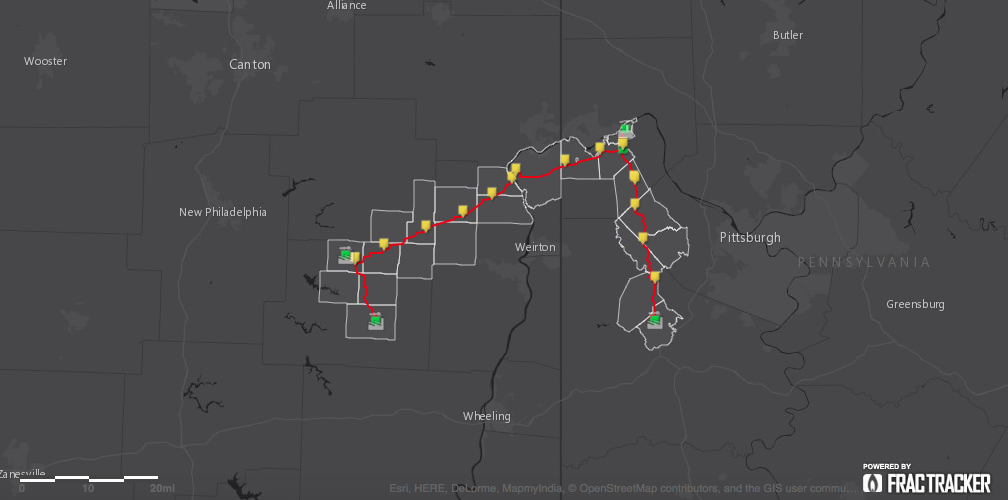
This screen shot shows the planned route of the Falcon Pipeline network and its associated facilities. The interactive map can be found here: https://maps.fractracker.org/latest/?appid=ae3e7531eae0453abb62e10fecdf3818
In November of 2017, CCJ joined a regional meeting at the People vs. Oil and Gas Summit to discuss the planned petrochemical buildout for the Ohio River valley, focusing primarily on the Shell Ethane Cracker Plant, the Appalachian Storage Hub, and the Falcon Pipeline. Various organizations throughout the region – from Pennsylvania to Kentucky – came together to identify what was known about each project, but also to plan how to move forward to protect our air and water quality.
Background Information:
The Shell Ethane Cracker Plant in Beaver County is a proposed plant where oil and gas would be transported to be broken down into ethylene and polyethylene. Ethylene, in turn, is used to make plastics. The process of “cracking” the oil and gas to make ethylene, though, can release pollutants like nitrogen oxides, sulfur dioxide, and particulate matter into the air. They also can emit volatile organic compounds that react with other compounds in the air when exposed to sunlight, causing smog. Pittsburgh’s air quality, while significantly better than it was years ago, still remains in the dirtiest 6% of U.S. cities. While legislators like to say that they are not spending money on the Cracker Plant, the tax credits to Shell Chemical will value $1.65 billion over 25 years, the largest tax break in PA history.
The Appalachian Storage Hub (ASH) is a proposed underground storage area. One hundred million barrels of natural gas liquids would be stored in a yet-to-be-built system underground, utilizing underground caverns, salt caves, and other voids. Once natural gas is extracted from the Marcellus, Utica, and Rogersville shales in West Virginia, Kentucky, Ohio, and Pennsylvania, it can be stored underground until it is ready to be sent through a pipeline network to its destination. When the Aliso Canyon storage facility had a leak in 2015, the carbon footprint is said to have been larger than the Deepwater Horizon storage leak in the Gulf of Mexico, with further-reaching consequences.
The Falcon Pipeline Network is a planned buildout of a 97.5 mile high-pressure pipeline, similar to the Mariner East 2, that would transport ethane through Ohio, West Virginia, and Pennsylvania to Shell’s Ethane Cracker Plant in Beaver County. Pipelines, particularly highly pressurized ones like this, leak: the high consequence areas (HCAs), or areas that would be affected by the vapors leaked from the pipeline, include more than 8,700 residents, 5 schools, 6 daycare centers, and 16 emergency response centers.
CCJ is working with allies to convene regional efforts to protect public health and safety from the threats posed by these projects. Not all of these projects are in our communities (the falcon pipeline cuts through northern Washington County)but we will feel the effects of increased fracking – and in some cases we already have, as we are hearing from more landowners being asked to sign leases. Our communities are already overly-extracted and the risks to water and air quality will affect the region at large. We continue to support and stand for the people who are most impacted by fossil fuel extraction and its related activities.

